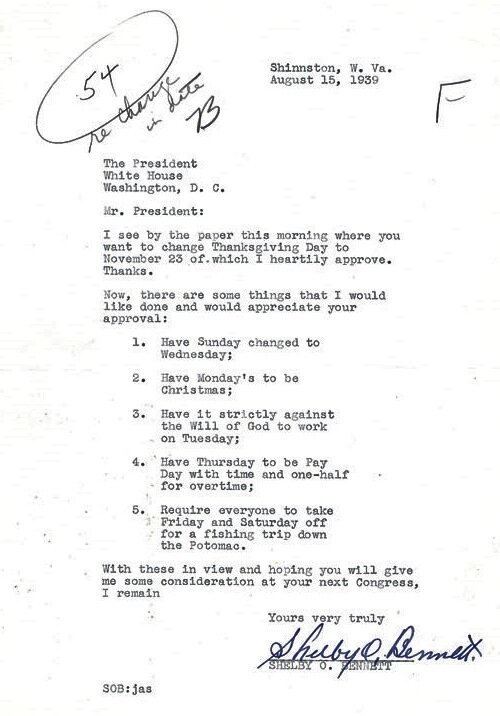Happy "Franksgiving"
Thanksgiving was not a national holiday when first celebrated by the Pilgrims in 1621. For one thing, there was no nation to have a national holiday in 1621. Over 150 years later, after the United States became independent, George Washington issued this proclamation:
“Congress has…requested me to recommend to the People of the United States a day of public thanksgiving and prayer to be observed by acknowledging with grateful hearts the many signal favors of Almighty God… I … assign Thursday the 26th day of November next to be devoted by the People of these States to the service of that great and glorious Being, who is the beneficent Author of all the good that was, that is, or that will be.”
President John Adams continued to declare Thanksgiving, but President Jefferson, skeptical about the role of God, discontinued them. The holiday continued on an occasional basis for another 50 years until the 1860’s. Different States celebrated the holiday, if at all, on different dates.
Abraham Lincoln and the National Holiday
Sara Josepha Hale
Poet, magazine editor and author of ‘Mary had a little lamb’, Sarah Josepha Hale, wrote letters over a 17-year period to five Presidents of the United States lobbying to make Thanksgiving a national holiday. In 1863 she wrote to President Lincoln:
“Permit me, as Editress of the "Lady's Book", to request a few minutes of your precious time, while laying before you a subject of deep interest …This subject is to have the day of our annual Thanksgiving made a National and fixed Union Festival…”
Shortly thereafter Lincoln issued a proclamation setting the last Thursday of November as Thanksgiving Day:
“The year…has been filled with the blessings of fruitful fields and healthful skies… I do therefore invite my fellow citizens…to set apart and observe the last Thursday of November next, as a day of Thanksgiving and Praise to our beneficent Father who dwelleth in the Heavens.”
There has been an annual Presidential Thanksgiving Proclamation since 1863.
Franklin D. Roosevelt and “Franksgiving”
Satirical Letter sent to FDR
This is not the end of the story. Thanksgiving was still just a tradition set each year by Presidential proclamation. November 1939 had five Thursdays. President Franklin D. Roosevelt (FDR) broke tradition and proclaimed the fourth Thursday as Thanksgiving rather than the last (fifth) one. FDR, based on a petition from retailers, believed that an earlier Thanksgiving would create a longer Christmas selling season and boost the economy, still recovering from the depression. Personally, I don’t follow the logic. I have a list of people on my gift list and that does not change just because there are more shopping days. And, like many, it is possible that I am a procrastinator waiting until the last possible moment to purchase my gifts. I have always felt that Christmas Eve is a great, inspirational time to shop. Moving Thanksgiving earlier just gives me, and numerous others, more time to stall.
There was wide resistance to FDR’s change. Calendar makers had to reprint now obsolete materials. Football coaches were upset over the effect on Thanksgiving Day game schedules. Plymouth, the home of the Pilgrims, complained vociferously about upsetting tradition. Reflecting the partisanship of the era, November 30, 1939 became known as the "Republican Thanksgiving" and November 23 as the "Democratic Thanksgiving". The earlier date was also called "Franksgiving", a portmanteau of Franklin Roosevelt and Thanksgiving. Since Thanksgiving was not yet a law, it was up to the states to decide when to celebrate the holiday. They evenly split between the two dates. Several states, including Texas, Colorado and Mississippi, apparently decided to celebrate both days.
FDR continued his theory by declaring the third Thursday of November to be Thanksgiving in 1940 and 1941. Again, the states split on the dates within their borders. Finally, in late December 1941, Congress passed Thanksgiving into law, mandating celebration on the fourth Thursday in November.
Thanksgiving, under that name, is observed in the United States and Canada. Canada declared Thanksgiving a national holiday in 1879, and fixed the October date in 1957. Harvest Festivals, similar in concept to Thanksgiving, are widely celebrated around the world. But “Franksgiving” is no more.

